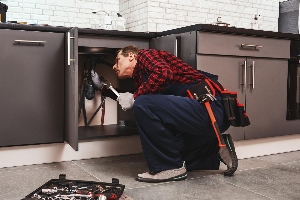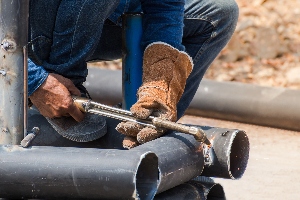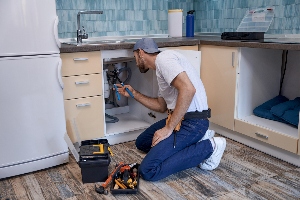A malfunctioning water heater can disrupt your daily comfort and efficiency, leaving you without hot water when you need it most. One of the key signs that it's time to replace your water heater is its age. Typically, a water heater lasts about 8-12 years, and if yours is within this age range, you should start considering a replacement, particularly if performance issues arise.
Beyond age, other crucial indicators include irregular hot water supply, strange noises from the unit, and visible signs of rust or leakage. Addressing these problems promptly can prevent more extensive damage and ensure consistent hot water availability. Regular inspection and maintenance can help you recognize these issues early.
Recognizing the Age and Lifespan of Your Water Heater
The age of your water heater is a critical factor in determining whether it’s time for a replacement. Older units, particularly those that are 8 to 12 years old for traditional tank models, often need attention. Tankless water heaters typically have a longer lifespan, lasting up to 20 years with proper maintenance.
To find the age of your water heater, you can check the serial number on the unit. Manufacturers often encode the manufacturing date in the serial number.
Recognizing the signs of an aging water heater is essential. These signs include inconsistent water temperature, rusty or cloudy water, and strange noises such as popping or rumbling.
If your water heater is older, it’s a good idea to explore replacement options before a complete failure occurs. This proactive approach can save you from the inconvenience and potential damage caused by a leaking or non-functional unit.
Identifying Common Signs of Water Heater Failure
When assessing whether your water heater may be failing, key indicators include a lack of hot water, rusty or discolored water, noise and strange sounds, and leaks or water pooling around the unit. Recognizing these signs early can help you avoid costly repairs and maintain a consistent hot water supply.
Lack of Hot Water
One of the clearest signs of water heater failure is no hot water. If you turn on the tap and water runs cold despite adjusting the thermostat, your heater may be failing. This issue could be due to a failing heating element, a broken thermostat, or sediment build-up in the tank.
Ignoring this problem can lead to further complications. Regular maintenance and professional inspection can help prevent this issue.
Rusty or Discolored Water
Rusty or discolored water often indicates internal corrosion. If rust is present in your water, it usually means that the water heater tank is rusting on the inside. This can eventually lead to leaks and even tank failure if not addressed promptly.
If you notice discolored water, it’s important to consider replacing the tank.
Noise and Strange Sounds
Unusual noises such as popping, cracking, or rumbling from your water heater can signal sediment buildup. Over time, this sediment hardens, causing the unit to work harder to heat water. This not only makes the heater inefficient but can also shorten its lifespan.
Flushing the tank regularly can help, but if the noise persists, it may be time for a replacement.
Leaks and Water Pooling
Leaks around your water heater are a serious issue that suggest internal problems or tank corrosion. Even small leaks can lead to water damage and mold growth in your home. If you see water pooling around the unit, it's crucial to act immediately.
You should check all connections and valves first. If the tank itself is leaking, replacement is usually necessary.
Understanding Water Heater Efficiency Issues
Efficiency is crucial when it comes to your hot water heater. An increase in your energy bills often signals that your unit is working harder than necessary. This inefficiency can stem from several factors.
Older water heaters may not meet current energy efficiency standards. They often have an EF rating (Energy Factor) that is lower than modern models.
An inefficient water heater might also take longer to heat water. If you notice delays, it might be time to evaluate the performance of your unit.
A rise in monthly energy costs despite consistent usage patterns is another red flag. Monitor these trends over several months to identify any unusual increases.
Signs of inefficiency include inconsistent water temperatures and increased noise levels from the unit. These indicate that your water heater is struggling and may need servicing or replacement.
Regular maintenance, such as flushing the tank and checking the anode rod, can prevent many issues. Still, when efficiency drops significantly, a replacement may be the best option.
Choose One Call Plumbing for reliable help. Our qualified plumbers provide exceptional service, ensuring that your hot water needs are met promptly and efficiently.
The Importance of Regular Maintenance and Repairs
Regular maintenance and timely repairs are crucial for your water heater. They ensure the unit works efficiently and extends its lifespan. Neglecting maintenance can lead to inefficient operation and costly repairs.
Scheduling periodic check-ups with a professional plumber helps identify small issues before they become major problems. Professionals can assess the condition of components like the anode rod, which protects the tank from corrosion.
A well-maintained water heater delivers consistent hot water. Flushing the tank to remove sediment build-up is essential. Sediment can cause the unit to overheat and reduce efficiency.
Inspecting the pressure relief valve annually prevents potential hazards. This valve releases excess pressure, avoiding potential explosions or leaks.
Benefits of Regular Maintenance:
- Prolongs water heater lifespan
- Improves efficiency
- Prevents unexpected breakdowns
- Ensures safety
Regular maintenance and timely repairs not only keep your water heater in top condition but also provide peace of mind knowing your home is safe and running efficiently.
When to Consult a Professional
If your water heater is aging, it's wise to monitor its performance closely. Units over 8-12 years old often require replacement. Consistent issues like fluctuating water temperature or low water pressure also signal it's time to consult a professional.
Leaking water heaters are a major concern. Minor leaks might just need a part replacement, but significant rust or widespread leakage usually means it's time for a new unit. Another sign is strange noises from the heater, indicating sediment build-up or mechanical problems that a professional plumber can diagnose.
If you suspect a gas leak, it's critical to call a pro immediately. Gas leaks are dangerous and require specialized expertise to handle safely. Similarly, electrical issues should be addressed by professionals to avoid the risk of fire or electric shock.
Consider consulting a professional if you notice that your water heater takes longer to heat water than it used to. Efficiency issues can drive up energy costs, making a replacement more cost-effective in the long run.
Options for Replacing Your Water Heater
When replacing your water heater, understanding the differences between tankless and storage tank models, the installation and removal process, and the various brands and warranties can help you make an informed decision.
Choosing Between Tankless and Storage Tank Water Heaters
Tankless water heaters provide on-demand hot water, making them more energy-efficient since they only heat water when needed. They typically have a longer lifespan of 10-20 years. Storage tank water heaters, on the other hand, store a large volume of hot water in a tank and generally have a lifespan of 8-12 years. While tankless models tend to have higher installation costs, storage tank heaters are less expensive upfront but may result in higher long-term energy bills.
Understanding the Installation and Removal Process
Proper installation of a new water heater involves several steps. First, the old unit must be safely removed, ensuring all connections are properly disconnected. The new unit requires precise installation to avoid potential issues.
Evaluating Water Heater Brands and Warranties
Selecting a water heater brand involves considering factors like reliability, efficiency, and warranty. Leading manufacturers such as Rheem, A.O. Smith, and Bradford White offer various models with diverse features. It's important to review the warranty terms; a good warranty provides peace of mind and protection against defects.
Addressing Technical and Safety Considerations
When considering replacing your water heater, addressing technical and safety considerations is crucial. It ensures both the long-term performance and safety of your household.
Safety Issues It's essential to be aware of potential hazards such as carbon monoxide leaks from gas water heaters. Keep your unit in well-ventilated areas and have a professional inspect it regularly.
Gas Valve Checks If you have a gas water heater, the gas valve requires routine inspection. A malfunctioning valve can cause gas leaks, leading to dangerous situations. Ensuring it works correctly can prevent potential accidents.
Circuit Breaker and Electrical Issues For electric water heaters, check the circuit breaker. Frequent tripping indicates electrical issues that need immediate attention. Make sure your heater's wiring is intact and up to code to avoid electrical hazards.
Hard Water Effects In regions with hard water, minerals can accumulate in your water heater, reducing its efficiency and lifespan. Installing a water softener or regularly flushing your heater can mitigate these effects.
Using an Expansion Tank An expansion tank can help manage excess pressure in the system, preventing potential damage to the water heater and plumbing. It's particularly useful in closed water systems where thermal expansion occurs.
Why Choose One Call Plumbing? For residents in Greenville & Spartanburg, we’re here for a trusted, reliable, and time-effective service. Our expertise ensures thorough inspections and top-quality repairs. Trust us to handle your plumbing needs with professionalism and dedication.
The Financial Implications of Water Heater Replacement
Replacing your water heater entails several financial considerations. One of the significant factors is the initial cost of the new unit and installation.
- Tank-based water heaters typically cost less upfront but may have higher long-term operational costs.
- Tankless water heaters cost more to install but offer improved efficiency.
Proper water heater replacement can lead to lower heating bills due to enhanced energy efficiency. Modern units use less energy, potentially saving you money every month.
Ignoring the signs for replacement might result in higher costs due to property damage from leaks or malfunctions. Regular maintenance can minimize these risks, but older units are more prone to failures.
Comfort is another crucial aspect. Reliable hot water improves daily routines and can enhance your quality of life. Investing in a high-efficiency model ensures consistent performance and reliable comfort.
By understanding these financial impacts, you can make an informed decision that balances cost, efficiency, and your long-term comfort.
Being proactive about your water heater's performance can prevent unexpected breakdowns and ensure comfort in your home. Recognizing the signs of a failing water heater, such as inconsistent hot water, strange noises, and leaks, is crucial.
Contact us to see what we can do for you.












